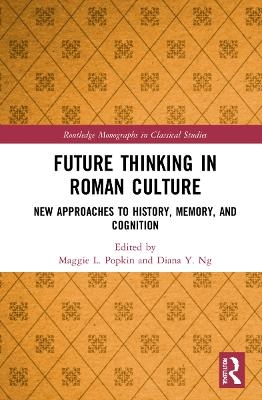
Future Thinking in Roman Culture
Routledge (Verlag)
978-0-367-68780-9 (ISBN)
This volume opens a new avenue of investigation for Roman memory studies in presenting multiple case studies of memory and commemoration as future-thinking phenomena. It breaks new ground by bringing classical studies into direct dialogue with recent research on cognitive processes of future thinking. The thematically linked but methodologically diverse contributions, all by leading scholars who have published significant work in memory studies of antiquity, both cultural and cognitive, make the volume well suited for classical studies scholars and students seeking to explore cognitive science and philosophy of mind in ancient contexts, with special appeal to those sharing the growing interest in investigating Roman conceptions of futurity and time. The chapters all deliberately coalesce around the central theme of prospection and future thinking and their impact on our understanding of Roman ritual and religion, politics, and individual motivation and intention.
This volume will be an invaluable resource to undergraduate and postgraduate students of classics, art history, archaeology, history, and religious studies, as well as scholars and students of memory studies, historical and cultural cognitive studies, psychology, and philosophy.
Maggie L. Popkin is the Robson Junior Professor in the Humanities and Associate Professor of Art History at Case Western Reserve University, USA. She is the author of The Architecture of the Roman Triumph: Monuments, Memory, and Identity (2016). Her research on Greek and Roman art and architecture has appeared in numerous edited volumes and journals including the American Journal of Archaeology, Hesperia, the Journal of the Society of Architectural Historians, and the Journal of Late Antiquity. She is a senior member of the American excavations in the Sanctuary of the Great Gods at Samothrace, Greece. Diana Y. Ng is Associate Professor of Art History at the University of Michigan-Dearborn, USA. Her research and publications address civic engagements with mythical history via public sculpture and architecture in Asia Minor, elite commemoration, and the application of cognitive theories of learning and remembering to the investigation of Roman public statuary and theatrical space. Her work has appeared in the Journal of Roman Studies, Istanbuler Mitteilungen, and edited volumes on Roman art, memory studies, and applications of cognitive theory to classical studies. She is the co-editor, with Molly Swetnam-Burland, of Reuse and Renovation in Roman Material Culture: Functions, Aesthetics, Interpretations (2018).
1 Introduction: New Approaches to Future Thinking in the Roman World 2 The Future of the Past: Fabius Pictor (and Dionysios of Halikarnassos) on the Pompa Circensis and Prospective Cultural Memory 3 Remembering the Future in Tacitus’ Annals: Germanicus’ Death and Contests of Commemoration 4 Ad Futuram Memoriam: The Augustan Ludi Saeculares 5 Staging Memories in the Home: Intention and Devotion in Pompeii and Herculaneum 6 Synagogue Inscriptions and the Politics of Prospective Memory 7 The Vicarello Milestone Beakers and Future-Oriented Mental Time Travel in the Roman Empire 8 Ancestors, Martyrs, and Fourth-Century Gold Glass: A Case of Metaintentions 9 Prospection in the Wild: Embodiment, Enactivity, and Commemoration
| Erscheinungsdatum | 04.01.2022 |
|---|---|
| Reihe/Serie | Routledge Monographs in Classical Studies |
| Zusatzinfo | 1 Tables, black and white; 29 Halftones, black and white; 29 Illustrations, black and white |
| Verlagsort | London |
| Sprache | englisch |
| Maße | 156 x 234 mm |
| Gewicht | 540 g |
| Themenwelt | Geisteswissenschaften ► Archäologie |
| Geschichte ► Allgemeine Geschichte ► Altertum / Antike | |
| Naturwissenschaften ► Biologie ► Humanbiologie | |
| Naturwissenschaften ► Biologie ► Zoologie | |
| ISBN-10 | 0-367-68780-1 / 0367687801 |
| ISBN-13 | 978-0-367-68780-9 / 9780367687809 |
| Zustand | Neuware |
| Informationen gemäß Produktsicherheitsverordnung (GPSR) | |
| Haben Sie eine Frage zum Produkt? |
aus dem Bereich


